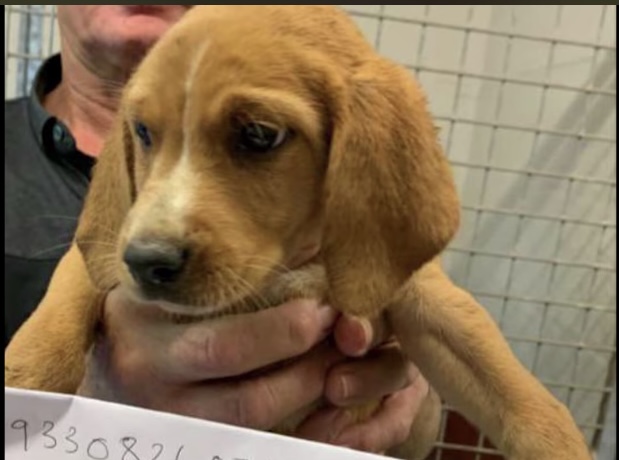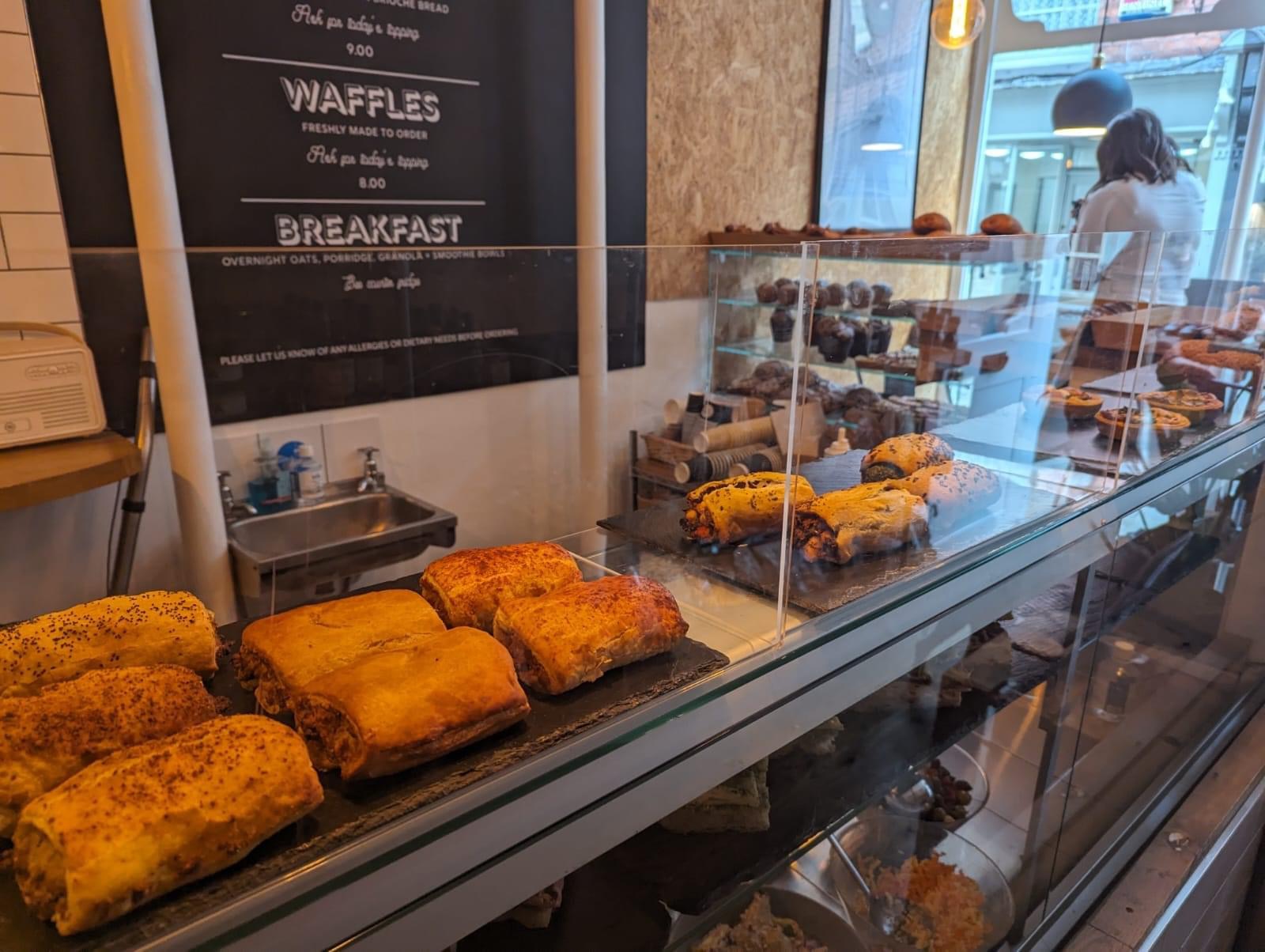From Gloucestershire Police:
Meet Clover, our wellbeing dog in training. Clover was one of more than 40 malnourished puppies rescued after being found in the back of a van on the #M6.
The puppies were discovered after eagle-eyed members of the public called us with concerns after spotting the van on 22 August last year in the Charlton Kings area of #Cheltenham.
Clover, who is believed to be a Labrador and Harrier mix breed, was one of 24 surviving puppies that were rehomed within our policing family and those involved in the rescue mission.
The Constabulary’s Welfare Officer Ruth Harrington rehomed Clover with the intention of training her to become the Force’s first wellbeing dog.
The move came following positive feedback about the benefits of dogs in helping people to relax and open up about their mental health.
Clover will shortly receive specialist training to support the mental health and wellbeing of officers and staff to deal with the stress and trauma linked to frontline policing.
Here is an article that gives an update on what happened to the other dogs discovered in August 2020:
More than 20 rescued puppies which have been nursed back to health after it is believed they were bred on a puppy farm have been rehomed.
Back in the summer two eagle-eyed members of the public called Gloucestershire Constabulary after they were concerned about what they had seen in the van in Charlton Kings, Cheltenham.
It was soon brought to a stop by police on the M6 and more than 40 malnourished puppies were found crammed inside with fears they had been stolen.
A man was subsequently arrested on suspicion of the theft of the puppies.
Police believe they had been travelling since the previous evening and the pups were crowded in crates with no food or water with many critically ill and too young to have been separated from their mothers.
All of the puppies, which were aged between five and eight-weeks-old, were provided emergency veterinary care after they were found on 22 August.
Breeds included chihuahua crosses, border collies, beagles and more and although initially suspected to have been stolen, it is now believed they had been on a journey from a puppy farm.
They were all in extremely poor health which is common with puppy farming and consistent with them having been kept in poor conditions that are dirty and cold.
Puppy farming is illegal and the puppies suffer and often die. These pups were in such poor health that, despite everyone’s best efforts, a number of them did not survive.
However 24 of the puppies did, including Freddie and Norbert, which were saved from the brink of death.
Gloucestershire Constabulary has now revealed that all of the puppies have been rehomed within the policing family and those involved in the rescue effort after an outpouring of offers of suitable homes from officers and staff.
After consulting with the RSPCA, all of them were rehomed in September with the adoption process completed throughout October and they have now settled in with their new families, with their health and confidence improved.
All adoptive owners paid a fee toward the puppy which contributed to food, kennels, vaccinations and vet bills. Several food donations were also received across the Constabulary.
DCI Claire Nutland, leading the investigation and rescue effort, said: “I would like to send a huge thanks to Wood Animal Hospital and Rushwood Kennels in Gloucestershire, and White House Vets and Brookend Kennels in Malvern. Their considerable assistance since the summer has been fantastic and thoroughly appreciated.
“A special thanks also needs to go to local behaviourist Estelle Vickery of Little Paws Behaviour and Training, who donated a significant amount of her time free of charge to conduct home checks and provide support to ensure the puppies had the best start in their new rescue homes after the worst start to their lives.
“Finally, the Constabulary would like to thank the members of the public that took the time to report this incident. Without their help, these puppies would have been delivered all over the country and many more would have died without urgent veterinary care.
“It is vital that people report suspicious activity to the police and animal cruelty or neglect to the RSPCA in order to tackle this global problem.”
‘A compassionate approach’ to the welfare of animals is a priority of the Police and Crime Commissioner’s Crime Plan, and animals are seen as sentient creatures rather than items when it comes to theft and other crimes.
Police and Crime Commissioner Martin Surl said: “A compassionate approach to all animals is not in the police and crime plan by accident. It is because the Chief Constable and I take it very seriously.
“This is a story with a happy ending but it could just as easily have gone the other way. I hope it encourages people that if they spot signs of animal cruelty or neglect to come forward as their concerns will be properly investigated by the Constabulary.”
Puppy farms are commercial breeders where multiple dogs are continually bred from, and the puppies sold for profit. They are kept in poor conditions, often not health tested prior to breeding, or health checked after birth, and are rarely vaccinated.
They are placed under a great deal of stress during transport and are usually malnourished, meaning they are more likely to fall ill. The adult and new born puppies rarely have any interaction with people or normal family homes, and so are poorly socialised which can lead to behavioural problems in the future.
Gloucestershire Constabulary urges people to do their research before buying puppies online, and have the following tips:
- Always use a reputable breeder. A list of assured breeders can be found on the Kennel Club website (www.thekennelclub.org.uk).
- Insist on visiting the puppies and seeing them with their litter mates and mother in the home. Make sure the mother is attentive to the puppies. Make sure the whole litter is clean, alert, and healthy.
- Never agree to meet or collect a puppy in a public place or to have the puppy delivered. These are ways to stop you seeing where the puppy was born.
- Reputable breeders will rarely use outbuildings to bring up their puppies. They will know the importance of good socialisation in the home. Many puppy farms will try to deceive prospective owners by bringing their puppies inside or to other homes for photographs and collection, so be careful and look for lots of outbuildings or sheds.
- Check if your breeder has posted any other adverts in the last three months. A puppy farm will likely be advertising several litters of different breeds at any one time. Research online the telephone number they provide, as they may list other litters under a different name, but will usually use the same contact number.
- Check the wording of the advert. If it is vague or generic, it is likely a puppy farm. If it says the puppies are eight weeks old and fully vaccinated, it is likely a puppy farm as they cannot be fully vaccinated at that age.
- A responsible breeder will ask many questions about you, your family, and lifestyle, to make sure you will be a good home. Puppy farms do not care who their dogs go to, so will likely only be interested in payment and will not try to find out if you are an appropriate owner.
- If you have any doubts, do not buy. Walk away. Report the advert to the website it was posted on. Report potential licence breaches to the local authority. Report poor conditions to the RSPCA. If you witness any cruelty, report to the police.
The investigation relating to the 24-year-old man from Durham who was arrested in connection with the incident is still ongoing.
One of the pups, Paddy, is shown below.





